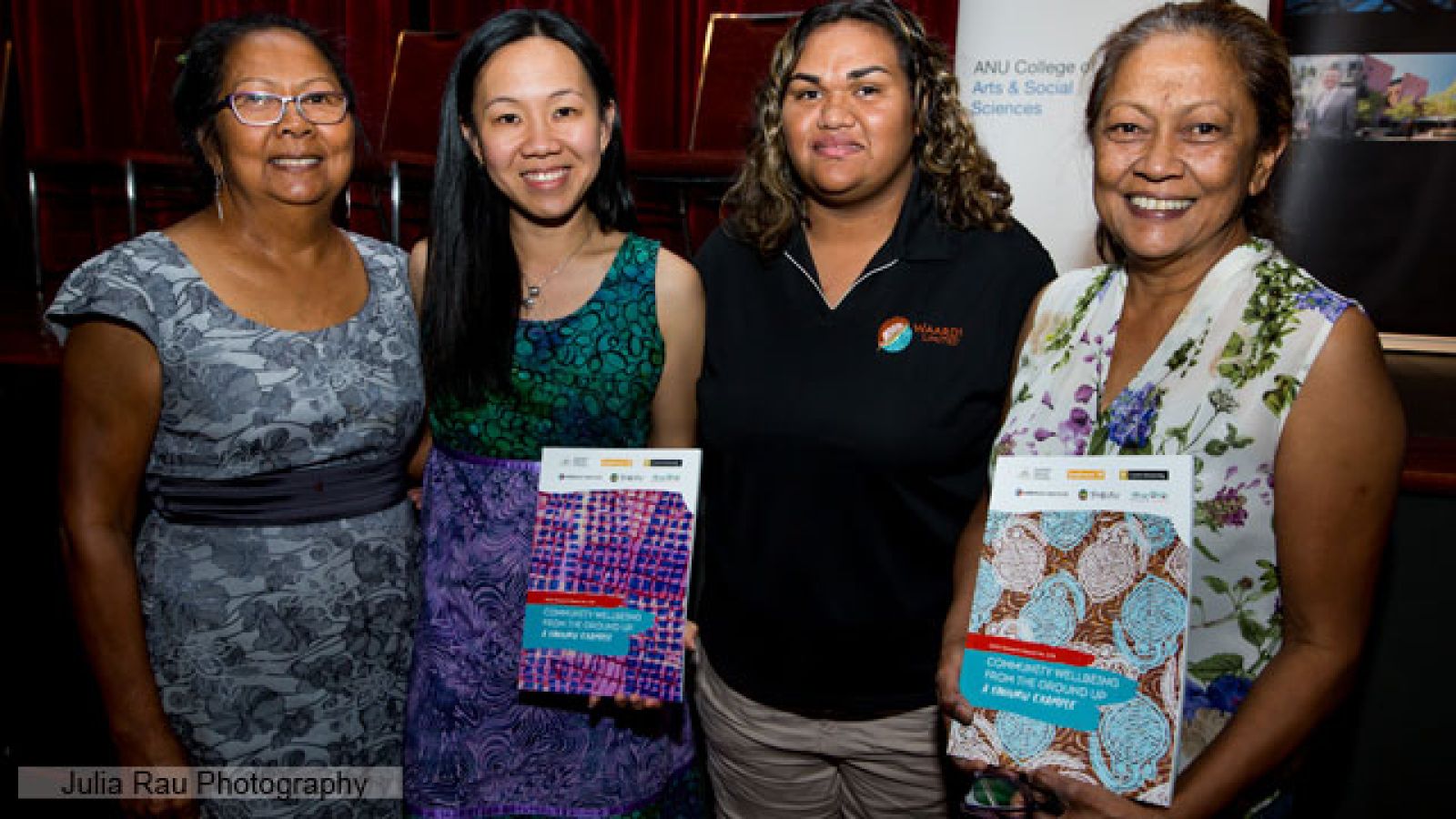Mandy gains a PhD, and bridges worlds

From left Lyn Yu Mackay, Mandy Yap, Kerstin Roe, and Eunice Yu at the launch of the Yawuru Community Wellbeing report. Image courtesy Julia Rau Photography
Mandy Yap is graduating on 15 December with a doctorate, plus research experience that’s enabled her to bridge both interdisciplinary differences, and also cultural differences between Indigenous, non-Indigenous, and new Australians.
Part of that involved building relationships with the Yawuru people of Broome, Western Australia, with whom Mandy had been collaborating since 2013. In particular, Mandy worked alongside Eunice Yu and the community to develop a unique report into the Indigenous community’s wellbeing, which was released in mid-2016.
“As an undergraduate and honours (ANU ’07) student, I have been trained in the discipline of economics,” she recalls.
“However, in the application of economic theory and quantitative methodologies during the course of my employment as a researcher at another university, critical questions of whether the intended research outcomes mean anything beyond policy and academia and the extent to which desk-based research reflects the reality of populations on the ground was always present.
“The critical questioning intensified when I started employment at the ANU Centre for Aboriginal Economic Policy Research (CAEPR).
“You learn to ask difficult questions, not to assume, and you learn the importance of different methodologies, different approaches and different knowledge systems.
“This was perhaps the most significant learning for someone like me who primarily worked with secondary data.
“That is the reason why I endeavoured to challenge myself and undertake a PhD at CAEPR, and work with mixed-methods research and primary data collection so that I have a more holistic understanding of the issue at hand.”
Mandy later learned about a speech by Yawuru leader, Peter Yu who outlined his community’s intention to build on their successful native title claim by creating a “Yawuru Wellbeing Index”. Their agenda matched her PhD research around constructing composite indices of wellbeing.
“We had a common ground and opportunity for a partnership with the Yawuru to conceptualise Yawuru wellbeing, thereby co-producing knowledge together,” Mandy says.
“The research with Yawuru focused on developing methodologies that would prioritise process – a process whereby Yawuru’s ways of seeing and understanding a good life would be the foundation of understanding wellbeing, and Yawuru’s participation would be embedded at every stage of the research process.
“The greatest learning I gained did not occur at my desk. Instead, it occurred on the ground, with my Yawuru teachers in the field as ‘experts’ sharing their stories and knowledge to enable me to gain a different perspective of living well.
“It is important to be flexible, to be open in your research approach and to take time to listen, not just hear.”
Mandy says the experience of building relationships and working with Yawuru people over several years was one of the highlights of the nearly 10 years she spent at CAEPR as a researcher-turned-PhD candidate.
“CAEPR has been pivotal in shaping my intellectual and professional journey,” she says.
“Working in a centre like CAEPR where you find economists, demographers, anthropologists, linguists, political scientists and sociologists, you begin to appreciate the different ways and approaches that one can take to understand the same issue.”
After submitting her PhD thesis in 2017, Mandy was offered a job at the University’s Crawford School of Public Policy.
“In my role at Crawford, I am part of a team working on the Individual Deprivation Measure (IDM), a new, gender-sensitive multidimensional measure of poverty,” she says.
“The measure aims to overcome many of the limitations of current approaches of measuring poverty and it is grounded in the views of poor men and women.
“The project is a partnership between the ANU and International Women’s Development Agency and funded by the Department of Foreign Affairs and Trade.”
Mandy says it was a challenge juggling full-time work and studying part-time, but she managed it, and found escapes such as with study breaks among the trees of the ANU campus, and coffee time with friends.
“One useful tip I can offer is to keep the communication lines open with your supervisors, your advisors and community partners so that they know when you are having some difficulties.
“It is always useful to have deadlines, although it seems daunting, as they can help keep you in check. However, it is also important to balance that with setting realistic deadlines.”
Mandy says she’s grown as a person through her PhD research and working alongside the Yawuru.
“As a migrant who came to this country to pursue an education and now calls Australia her second home, I have gained a deeper and more meaningful understanding, respect and appreciation of Australia’s First Peoples.”